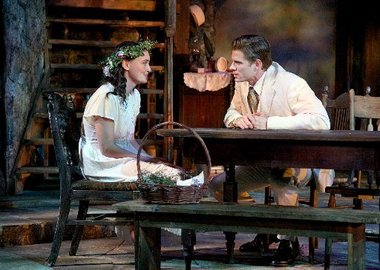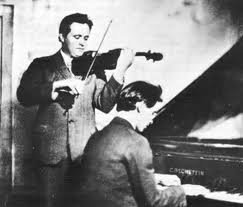Coleman Hawkins, To Be or Not to Bop (Wnts). The first great jazz saxophonist was also one of a handful of swing-era giants who successfully embraced bebop, both on and off record. This new mp3-only downloadable collection contains twenty-two of the bop-and-bop-flavored 78 sides that Hawkins recorded in the mid-to-late-Forties with such then-youngsters as Dizzy Gillespie, J.J. Johnson, Hank Jones, Howard McGhee, Fats Navarro, Oscar Pettiford, and Max Roach, including the premiere recordings of “I Mean You,” “Salt Peanuts” and “Woody’n You.” It’s the first time that Hawkins’ key bop recordings have been released in a single-source anthology. Listen and marvel at his ability to ride the wave of a radically innovative new jazz style (TT).
GALLERY
Sargent and Impressionism (Adelson Galleries, 19 E. 82, closes Saturday). Two dozen-plus paintings and watercolors in which John Singer Sargent, who befriended Monet and looked closely at his work, dabbled in the then-revolutionary language of French impressionism, almost always to striking (if not quite idiomatic) effect. Guaranteed to open the eyes of those who think of Sargent purely as as a high-society portraitist (TT).
TT: The girl in the kitchen sink
I went to Madison, New Jersey, last Saturday to see the Shakespeare Theatre of New Jersey perform I Capture the Castle. It was a knockout. Here’s an excerpt from my review in today’s Wall Street Journal.
* * *
 Doctors have a saying: “The dose makes the poison.” If you’re a playwright, charm works the same way. It’s an indispensable part of the dramatic pharmacopoeia, but put in a pinch too much and a show can cloy. That doesn’t happen in Dodie Smith’s “I Capture the Castle,” which is being performed for the first time on the East Coast by the Shakespeare Theatre of New Jersey. Not only does Smith’s stage version of her fizzy 1948 novel about a clever young woman teetering on the brink of adulthood get the dosage right, but it has been impeccably directed by Cameron Watson and is being performed on a handsome set by an ideal cast. The word “irresistible” is rarely true, but I don’t see how anyone not descended from Scrooge McDuck could fail to fall for “I Capture the Castle.”
Doctors have a saying: “The dose makes the poison.” If you’re a playwright, charm works the same way. It’s an indispensable part of the dramatic pharmacopoeia, but put in a pinch too much and a show can cloy. That doesn’t happen in Dodie Smith’s “I Capture the Castle,” which is being performed for the first time on the East Coast by the Shakespeare Theatre of New Jersey. Not only does Smith’s stage version of her fizzy 1948 novel about a clever young woman teetering on the brink of adulthood get the dosage right, but it has been impeccably directed by Cameron Watson and is being performed on a handsome set by an ideal cast. The word “irresistible” is rarely true, but I don’t see how anyone not descended from Scrooge McDuck could fail to fall for “I Capture the Castle.”
Smith, who died in 1990, was a British novelist and playwright who is best known for having written the book on which Walt Disney’s “One Hundred and One Dalmatians” was based. While none of her plays went over big on Broadway, the original version of “I Capture the Castle” has become something of a cult favorite, winning fans as varied as J.K. Rowling and Donald E. Westlake. The 1954 stage adaptation, however, is all but unknown, and until now had only received a single American production four years ago in Los Angeles.
Mr. Watson, who directed the show there, has restaged it in New Jersey, bringing with him one cast member, Rebecca Mozo, who plays Cassandra Mortmain, the budding novelist who is the play’s narrator. Cassandra, who sometimes likes to write while sitting in the kitchen sink, is a fey girl-woman who knows much of poverty–her impecunious family lives in a tumbledown castle–but nothing about men. “I know all about the facts of life,” she says firmly. “And I don’t think much of them.” Then her life is turned inside out when two rich young Americans declare themselves to be the owners of the castle in which the Mortmains live….
Each member of the cast catches the exact tone of his or her character, above all Ms. Mozo, who brings off with sweet grace the tricky task of showing us Cassandra’s discovery of the hurt of romantic love….
* * *
Read the whole thing here.
The theatrical trailer from the 2003 BBC film version of I Capture the Castle:
TT: The man who said no to Hitler
For the past couple of months, I’ve been working my way through Adolf Busch: The Life of an Honest Musician, Tully Potter’s massive two-volume biography of the greatest German violinist of the twentieth century, who is best known in this country for having co-founded the Marlboro Music School and Festival with Rudolf Serkin, his son-in-law and recital partner. Potter’s book is far too long for the ordinary reader, but so wonderfully well written and researched that anyone with more than a casual interest in Busch and his times will find it an unexpectedly easy read.
Part of what makes Adolf Busch: The Life of an Honest Musician so interesting, though, is that it also contains a bitingly frank account of how Germany’s classical musicians behaved under the Nazi regime. Busch, it turns out, was the only well-known non-Jewish German classical musician who conducted himself impeccably: he canceled all of his concert dates in Germany a few weeks after Hitler came to power in 1933, declaring himself to be disgusted by “the actions of my Christian compatriots against German Jews.”
I knew that most German musicians had collaborated with the Hitler regime in one way or another, but I hadn’t realized that Busch stood alone in his iron integrity. This fact inspired me to write a “Sightings” column for today’s Wall Street Journal in which I talk about what Busch did, and why it still matters. Here’s an excerpt.
* * *
Virtually all of the other big names in Austro-German music, including Wilhelm Furtwängler, Walter Gieseking, Herbert von Karajan, Carl Orff and Richard Strauss, stayed behind, some because they were active supporters of Hitler and others because they thought that the Nazis would dry up and blow away. Busch knew better. In a prophetic letter, he wrote, “Some of them believe that if they only ‘play along,’ the atrocities and injustice that are part and parcel of the movement will be tempered, can be turned around…they do not notice that they can only have a retarding effect, that the atrocities will still take place, only perhaps a bit later.”
 Busch’s principled stand was motivated in part by the fact that many of his closest friends and colleagues were Jewish, including Serkin and Karl Doktor, the violist of the Busch Quartet. But the Nazis, who were keenly aware of the force of public opinion, were prepared to look the other way at such things in order to prevent prominent non-Jewish Germans from leaving the country in protest. As late as 1937, it was discreetly made known to Busch that if he returned, the Nazi government would let Serkin come back as well. “If you hang Hitler in the middle, with Goering on the left and Goebbels on the right, I’ll return to Germany,” he replied.
Busch’s principled stand was motivated in part by the fact that many of his closest friends and colleagues were Jewish, including Serkin and Karl Doktor, the violist of the Busch Quartet. But the Nazis, who were keenly aware of the force of public opinion, were prepared to look the other way at such things in order to prevent prominent non-Jewish Germans from leaving the country in protest. As late as 1937, it was discreetly made known to Busch that if he returned, the Nazi government would let Serkin come back as well. “If you hang Hitler in the middle, with Goering on the left and Goebbels on the right, I’ll return to Germany,” he replied.
As anti-Semitic laws spread across the continent, Busch responded by cancelling there as well, and at the end of 1939 he, Serkin and the members of the Busch Quartet moved to the U.S. What happened next was a tragedy. Though Serkin was quickly able to establish himself as a top-tier soloist, America in the ’40s had an oversupply of famous violinists and a limited appetite for chamber music. Busch was able to eke out a living, but his days of fame were over….
* * *
Read the whole thing here.
TT: Almanac
“Art is a revolt against fate.”
André Malraux, Voices of Silence
TT: So you want to see a show?
Here’s my list of recommended Broadway, off-Broadway, and out-of-town shows, updated weekly. In all cases, I gave these shows favorable reviews (if sometimes qualifiedly so) in The Wall Street Journal when they opened. For more information, click on the title.
Warning: Broadway shows marked with an asterisk were sold out, or nearly so, last week.
BROADWAY:
• La Cage aux Folles (musical, PG-13, adult subject matter, reviewed here)
• Driving Miss Daisy * (drama, G, possible for smart children, closes Jan. 29, reviewed here)
• A Free Man of Color (epic comedy, PG-13/R, adult subject matter, closes Jan. 9, reviewed here)
• Lombardi (drama, G/PG-13, a modest amount of adult subject matter, reviewed here)
• The Merchant of Venice * (Shakespeare, PG-13, adult subject matter, closes Jan. 9, reviewed here)
• Million Dollar Quartet (jukebox musical, G, reviewed here)
OFF BROADWAY:
• Alfred Hitchcock’s The 39 Steps (comedy, G, suitable for bright children, closes Jan. 16, original Broadway production reviewed here)
• Angels in America (drama, PG-13/R, adult subject matter, closes Feb. 20, reviewed here)
• Avenue Q (musical, R, adult subject matter and one show-stopping scene of puppet-on-puppet sex, reviewed here)
• The Fantasticks (musical, G, suitable for children capable of enjoying a love story, reviewed here)
• Play Dead (theatrical spook show, PG-13, utterly unsuitable for easily frightened children or adults, reviewed here)
CLOSING SOON ON BROADWAY:
• Bloody Bloody Andrew Jackson (musical, PG-13/R, closes Jan. 2, reviewed here)
• Fela! (musical, PG-13, adult subject matter, closes Jan. 2, reviewed here)
• The Pee-wee Herman Show (comic revue, G/PG-13, heavily larded with double entendres, closes Jan. 2, reviewed here)
CLOSING SOON IN WASHINGTON, D.C.:
• Oklahoma! (musical, G, suitable for children, closes Dec. 30, reviewed here)
CLOSING SUNDAY ON BROADWAY:
• The Pitmen Painters (serious comedy, G, too demanding for children, reviewed here)
TT: Almanac
“The sons of torture victims make good terrorists.”
André Malraux, Man’s Fate
TT: Snapshot
A rare kinescope of Sammy Davis, Jr., and the Will Mastin Trio performing on The Buick-Berle Show in 1954. In this excerpt from the group’s nightclub act, Davis impersonates Nat King Cole, Tony Bennett, Vaughn Monroe, Billy Eckstine, Jimmy Cagney, Jimmy Stewart, Cary Grant, Frankie Laine, and Jerry Lewis:
(This is the latest in a weekly series of arts-related videos that appear in this space each Wednesday.)
